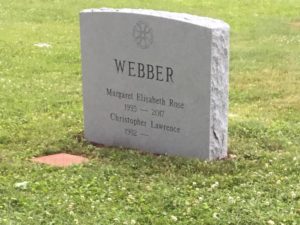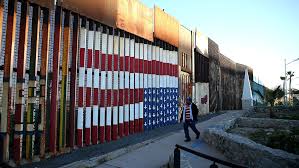NOW AND THEN
A sermon given at the Church of the Incarnation, San Francisco, California, on September 29, 2019, by Christopher L. Webber.
I wish we could read the story of Dives and Lazarus on Easter Day.
We come to church on Easter Day to give thanks for the gift of eternal life, life after death, Resurrection life – with happy, upbeat hymns and Easter eggs and chocolate bunnies and wouldn’t it be good to have this story with a few more specifics about eternal life? about the rich man and the poor man, about Dives and Lazarus? who died and went elsewhere. Both of them were given eternal life but not in the same place and that might be worrisome.
Does it worry you? I’m getting old enough that I have to worry. I pay for my living space a month at a time. More and more people live to be 90 and even 100, but not 110. They’re working on it, but we’re not there yet. And even 150, which some think is someday possible, is a blink of an eye to eternity. Primitive human beings were honoring their dead with burial and burying useful tributes in the  grave 100,000 years ago and that’s a long time, but even that is not eternity, not eternity. Eternal life is a long time. This life is not a long time. whether it’s three score years and ten or ninety-five, or one hundred and ten, it still has an ending and this morning’s parable puts that ending in graphic terms: Lazarus in the bosom of Abraham and Dives in flames.
grave 100,000 years ago and that’s a long time, but even that is not eternity, not eternity. Eternal life is a long time. This life is not a long time. whether it’s three score years and ten or ninety-five, or one hundred and ten, it still has an ending and this morning’s parable puts that ending in graphic terms: Lazarus in the bosom of Abraham and Dives in flames.
I have two points to make:
1 – God cares how we use our money
2 – Eternal life is real
So Point One is that there is a destiny, we’re going somewhere. We’re here for a purpose. And there’s a loving God who gives us that purpose. And it’s not about how much you can pile up. Have you seen the stories about the family who owned the company that made oxycontin that killed however many people – thousands and thousands – but made one family rich, filthy rich. And when the government began to catch up with them they transferred billions to secret accounts. It’s blood money; but they’re hanging onto it. Like Dives. Eat, drink, and be merry – and hope the Feds don’t get you, and hope there’s no hereafter because if there is, they’re in big trouble. God cares how you use your money. God cares how YOU use YOUR money. I don’t know whether there are literal flames below or not – I’ll come back to that – but I know I don’t want to face my creator with blood on my hands. And I’m not sure there isn’t.
How does the government use my money? To build a wall, to incarcerate women and children fleeing conditions our policies helped create. We spend more money on bombs and guns – military – than  anything else, and how much good does it do? But I am a citizen of a country that builds walls and makes bombs and I may or may not have voted for a particular candidate but did I work for someone else or sit on the sidelines? I’m a citizen and I’m responsible.
anything else, and how much good does it do? But I am a citizen of a country that builds walls and makes bombs and I may or may not have voted for a particular candidate but did I work for someone else or sit on the sidelines? I’m a citizen and I’m responsible.
But forget the government, how do I myself spend my money? I donate to Episcopal Relief and Development every Christmas and I know they do good things, but I spend more on myself every month for things I don’t really need. Is my lifestyle more like Dives or Lazarus? Notice that nothing is said about who went to church or synagogue or mosque – only one thing counts in this story that Jesus told: Dives had the good things all his life and he never shared so much as the crumbs with the poor man at his gate. And that settles it. That does it. That’s all that matters.
How do you and I measure up? Did I – did you – do something about the needs around us while we had time or did we not? What charities do you support? And how will you vote in this next election? Will you ask what’s in it for me or are you asking, How can we as a country do most for those with the most needs whoever and wherever they may be?” Are we asking which candidate will lower my taxes most or which candidate shares my values most fully in terms of human need? This country perhaps is Dives and perhaps Honduras is Lazarus.
How should we respond? “Stay away from my door?” “Build a wall?” People who think you can separate church and state need to look at the Bible. It’s a political document; it’s about God at work in history. Jesus talked often about money, about wealth and poverty. God cares and God wants us to care. And when you get a stewardship letter sometime in the next few weeks we need to consider our response in these terms: in the light of eternity: sub specie aeternitatis. So let me also say a word or two about that: about eternity and eternal life.
And notice also that Lazarus gets named in the story, but not the rich man. Names matter. And the poor man got no recognition from the rich man, but Jesus only names Lazarus. The rich man is just another rich man: met one, you’ve met them all. Somewhere later on in the Middle Ages they began calling the rich man “Dives,” the Latin word for “rich.” Maybe his name was Richard and they called him Rich for short. God, I believe, knows the rich man also by name but Jesus doesn’t give him a name. He’s just “a certain rich man who fared sumptuously every day.” As I do. As most of us do, although there are homeless men and women lying not far from our doors. But Lazarus is given a name to make the point: the Good Shepherd knows his sheep whether the world does or not.
Second, think about the picture of flames and all that. I don’t expect the scene painted in the gospel to play out in real time, or at the end of time. I think pearly gates and raging fire – or, perhaps, as Dante saw it, a place of terrible cold – are useful images. Perhaps they are, but I know perfectly well that whatever comes next is beyond picturing, beyond imagining, because my imagination is so narrowly limited by the familiar things of tis earth. The Bible pictures heaven as Jerusalem – only better. You might think of it as an infinite golf course or an endless Mozart concert. You might see it as a choice between Tahoe and Arizona. Our imaginations are too small. But the picture the gospel gives us, I think, is a useful reminder all the same that how we live matters. It matters.
 Speaking of the picture the Bible gives us, let me end with a word about the picture that came with your Bulletin this morning. I printed up some pictures because, they say, one picture is worth a thousand words. It almost doubles the length of the sermon. But the passage we read this morning describes Lazarus with Abraham. It says that Dives saw Abraham far away with Lazarus “by his side.” But that’s not what the Bible says. Some of us are old enough to remember the King James Version that says Dives saw Abraham “afar off and Lazarus in his bosom.” So the modern translators were squeamish about that and we get “by his side” Instead of “in his bosom.” But what St Luke wrote was “En tois kolpois autou” – “In his bosom.” You can look it up. So that’s why I got that picture printed. There’s Lazarus: maybe we could say he’s “in Abraham’s lap” and all the other souls are lined up to get their turn. It’s very real and very physical and that’s important, really important.
Speaking of the picture the Bible gives us, let me end with a word about the picture that came with your Bulletin this morning. I printed up some pictures because, they say, one picture is worth a thousand words. It almost doubles the length of the sermon. But the passage we read this morning describes Lazarus with Abraham. It says that Dives saw Abraham far away with Lazarus “by his side.” But that’s not what the Bible says. Some of us are old enough to remember the King James Version that says Dives saw Abraham “afar off and Lazarus in his bosom.” So the modern translators were squeamish about that and we get “by his side” Instead of “in his bosom.” But what St Luke wrote was “En tois kolpois autou” – “In his bosom.” You can look it up. So that’s why I got that picture printed. There’s Lazarus: maybe we could say he’s “in Abraham’s lap” and all the other souls are lined up to get their turn. It’s very real and very physical and that’s important, really important.
Don’t let people soften it up by talking about souls. Jesus never talked about souls nor did Paul. They talked about the resurrection of the body. Not, of course, these particular atoms which are new every seven years anyway, but what Paul calls a “resurrection body.” Buddhists believe in immortal souls but Christians believe in the resurrection of the body: a resurrected body that Abraham can embrace. Bodies matter – now and hereafter – bodies matter. We are physical beings with physical needs, and we will be judged hereafter by how we cared for those needs – and especially the needs of others, those lying at our gate, those outside the wall. We come here, and form a community to support each other in this brief pilgrimage and to do what we can to reach out to Lazarus – while we have time.
 Christopher L. Webber
Christopher L. Webber
Thanks Chris. Good timing as stewardship is broached this Sunday.